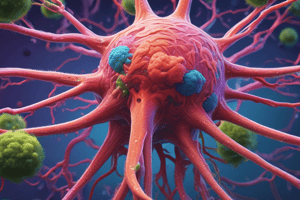Podcast
Questions and Answers
What is the primary function of the lymphatic system?
What is the primary function of the lymphatic system?
- To defend the body from infections and maintain fluid balance (correct)
- To produce hormones for metabolic regulation
- To store energy for muscle movement
- To circulate blood throughout the body
Which of the following organs is responsible for producing T cells?
Which of the following organs is responsible for producing T cells?
- Bone Marrow
- Thymus (correct)
- Lymph Nodes
- Spleen
What type of fluid is delivered by lymphatic vessels back to the bloodstream?
What type of fluid is delivered by lymphatic vessels back to the bloodstream?
- Plasma
- Serum
- Cerebrospinal fluid
- Lymph (correct)
Which of the following is a symptom of lymphoma?
Which of the following is a symptom of lymphoma?
What role do lymph nodes play in the lymphatic system?
What role do lymph nodes play in the lymphatic system?
Which part of the lymphatic system is primarily responsible for the production of white blood cells?
Which part of the lymphatic system is primarily responsible for the production of white blood cells?
What are the two types of lymphoma mentioned?
What are the two types of lymphoma mentioned?
Where in the body are lymph nodes most commonly located?
Where in the body are lymph nodes most commonly located?
What is a common symptom of mononucleosis?
What is a common symptom of mononucleosis?
Which of the following can cause lymphadenopathy?
Which of the following can cause lymphadenopathy?
What could occur if the body lacks a functioning lymphatic system?
What could occur if the body lacks a functioning lymphatic system?
Which of the following statements about mononucleosis is true?
Which of the following statements about mononucleosis is true?
How does the lymphatic system support the immune system?
How does the lymphatic system support the immune system?
What is one role of the lymphatic system regarding fatty substances?
What is one role of the lymphatic system regarding fatty substances?
What is a key treatment recommendation for someone with mononucleosis?
What is a key treatment recommendation for someone with mononucleosis?
What happens to the body without the lymphatic system's ability to transport fluids?
What happens to the body without the lymphatic system's ability to transport fluids?
Flashcards are hidden until you start studying
Study Notes
How the Lymphatic System Works
- Functions as a key component of the immune system, defending against infections and maintaining fluid balance.
- Comprises four main components: lymphatic vessels, tissues, organs, and glands, working together to drain excess lymph from tissues back into the bloodstream.
Components of the Lymphatic System
- Lymphatic Vessels: Similar to blood vessels; transport lymph, a fluid rich in white blood cells, and collect excess fluids for return to circulation.
- Bone Marrow: Produces white blood cells crucial for immune response.
- Thymus: Located between the lungs; matures T cells, which respond to foreign invaders; some tissue is replaced after puberty.
- Spleen: Filters and stores white blood cells; activates them when needed.
- Lymph Nodes: Bean-shaped organs scattered throughout the body that filter lymph and store white blood cells; commonly located in the neck, armpits, and groin.
- Tonsils: Small lymphatic structures in the throat that filter germs entering through the mouth and nose.
Conditions and Disorders of the Lymphatic System
- Lymphoma: A blood cancer affecting the lymphatic system, presenting symptoms like swollen lymph nodes, fever, night sweats, weight loss, itching, and fatigue. Two main types: Hodgkin (often curable) and Non-Hodgkin (prognosis varies).
- Lymphadenopathy: Swelling of lymph nodes caused by infections, autoimmune diseases, or malignancies; can result from exposure to animals, insects, or travel.
- Mononucleosis: An illness lasting 1-2 months, symptoms include fever, fatigue, sore throat with white patches, enlarged spleen, rash, liver inflammation, and swollen lymph nodes. Treatment emphasizes rest, hydration, and pain management.
Consequences of Lacking the Lymphatic System
- Absence would lead to significant swelling due to fluid accumulation.
- Increased vulnerability to infections as white blood cells would be less effective at trapping pathogens.
- Nutritional deficiencies due to inadequate transport of fatty substances essential for nutrition.
- Risk of dehydration from impaired fluid transport, possibly resulting in severe physiological consequences.
Interaction with Other Body Systems
- Collaborates with the circulatory system by draining fluids and proteins for return to circulation.
- Part of the immune response, filtering and combating germs.
- Involved in the absorption of fats from the intestines and delivery of certain hormones.
Studying That Suits You
Use AI to generate personalized quizzes and flashcards to suit your learning preferences.



